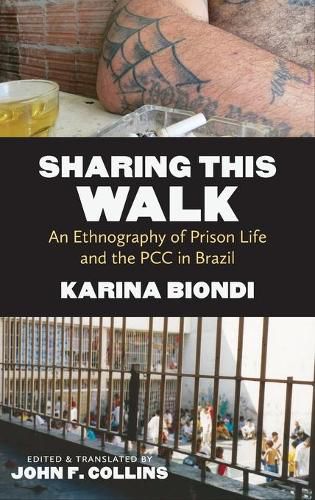Readings Newsletter
Become a Readings Member to make your shopping experience even easier.
Sign in or sign up for free!
You’re not far away from qualifying for FREE standard shipping within Australia
You’ve qualified for FREE standard shipping within Australia
The cart is loading…






The Primeiro Comando do Capital (PCC) is a Sao Paulo prison gang thatsince the 1990s has expanded into the most powerful criminal network inBrazil. Karina Biondi’s rich ethnography of the PCC is uniquely informedby her insider-outsider status. Prior to his acquittal, Biondi’s husband wasincarcerated in a PCC-dominated prison for several years. During the periodof Biondi’s intense and intimate visits with her husband and her extensivefieldwork in prisons and on the streets of Sao Paulo, the PCC effectively controlledmore than 90 percent of Sao Paulo’s 147 prison facilities.
Available for the first time in English, Biondi’s riveting portrait of thePCC illuminates how the organisation operates inside and outside of prison,creatively elaborating on a decentered, non-hierarchical, and far-reachingcommand system. This system challenges both the police forces againstwhich the PCC has declared war and the methods and analytic concepts traditionallyemployed by social scientists concerned with crime, incarceration,and policing. Biondi posits that the PCC embodies a politics of transcendence, a group identity that is braided together with, but also autonomousfrom, its decentralized parts. Biondi also situates the PCC in relation toredemocratization and rampant socioeconomic inequality in Brazil, as wellas to counter-state movements, crime, and punishment in the Americas.
$9.00 standard shipping within Australia
FREE standard shipping within Australia for orders over $100.00
Express & International shipping calculated at checkout
The Primeiro Comando do Capital (PCC) is a Sao Paulo prison gang thatsince the 1990s has expanded into the most powerful criminal network inBrazil. Karina Biondi’s rich ethnography of the PCC is uniquely informedby her insider-outsider status. Prior to his acquittal, Biondi’s husband wasincarcerated in a PCC-dominated prison for several years. During the periodof Biondi’s intense and intimate visits with her husband and her extensivefieldwork in prisons and on the streets of Sao Paulo, the PCC effectively controlledmore than 90 percent of Sao Paulo’s 147 prison facilities.
Available for the first time in English, Biondi’s riveting portrait of thePCC illuminates how the organisation operates inside and outside of prison,creatively elaborating on a decentered, non-hierarchical, and far-reachingcommand system. This system challenges both the police forces againstwhich the PCC has declared war and the methods and analytic concepts traditionallyemployed by social scientists concerned with crime, incarceration,and policing. Biondi posits that the PCC embodies a politics of transcendence, a group identity that is braided together with, but also autonomousfrom, its decentralized parts. Biondi also situates the PCC in relation toredemocratization and rampant socioeconomic inequality in Brazil, as wellas to counter-state movements, crime, and punishment in the Americas.